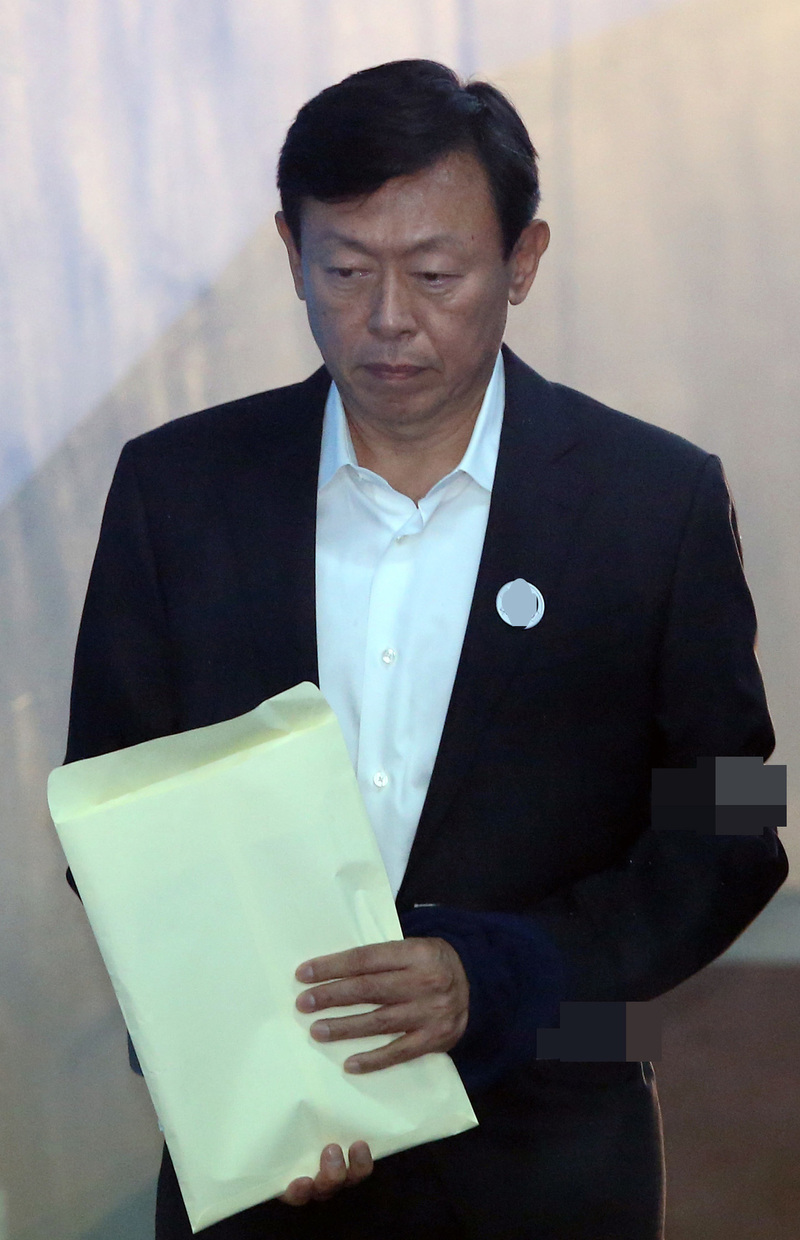Posted on : Oct.6,2018 15:23 KST
 |
|
Lotte Group Chairman Shin Dong-bin heads to Seoul Central District Court on Oct. 5 to hear the ruling of the appeals court. (photo pool)
|
On Oct. 5, Lotte Group Chairman Shin Dong-bin was released from prison on a suspended sentence by an appeals court. Considering that an appeals court gave Samsung Electronics Vice Chairman Lee Jae-yong a suspended sentence this past February, the ruling is prompting criticism that the courts are going easy on the owners of South Korea’s family-owned conglomerates, known as chaebols.
Hon. Kang Seung-jeung, head of the 8th criminal division at the Seoul High Court, sentenced Shin to two-and-a-half years in prison, suspended for four years. Shin had been indicted for corporate corruption and for giving 7 billion won (US$6.2 million) in bribes to former president Park Geun-hye in exchange for preferential treatment for his company’s duty-free stores.
In his initial trial at a district court, Shin was convicted on the bribery charge and taken into custody to serve a two-and-a-half year prison sentence. In that trial, he was also convicted of the corruption charge, which resulted in a sentence of one year and eight months, suspended for two years.
Appeals court says Shin is a “victim” who was “intimidated” by Park Geun-hye
The appeals court sided with the lower court in acknowledging the quid-pro-quo nature of Shin’s request for duty-free store favors and found him guilty of giving a bribe of 7 billion won (US$6.2 million) to the K-Sports Foundation, which was operated by Park Geun-hye’s confidant Choi Soon-sil. But the court demurred from holding Shin strictly responsible for the bribe “in a situation in which his decision-making freedom was so restricted that he was afraid that refusing the president’s request would create problems for all his corporate activities.”
The court completely accepted Shin’s claim that he was “a victim” who had been “intimidated by the president.”
This clashes with the ruling by the lower court, which emphasized the need to eradicate collusion between the government and big business.
“If we treated the defendant leniently simply because the president had made the request, no company would be free of the temptation to succeed through bribes rather than competition. Bribes that pass between the president and chaebol owners, who are at the pinnacle of political and economic power, respectively, must be punished severely,” the lower court said in its ruling.
The appeals court’s ruling is being criticized as another example of what’s called the “three-five rule” in Korea, in which misbehaving chaebol heads are given prison sentences of no more than three years, suspended for five years. Another common pattern is for a corrupt chaebol leader to be sent to prison by a district court and then set free on appeal. Such practices only increase distrust in the judiciary.
Shin’s suspended sentence will go down as one more reminder that the wealthy aren’t subject to the same laws as the rest of us. Perhaps in recognition of this, even the court said that “even though the Lotte Group is one of Korea’s top five conglomerates, such matters as the group’s business activity, the management rights of the owner’s family and the possible effect on the business community should not be taken into account in this ruling.”
But hardly any Koreans will take that caveat at face value. This has only further reinforced the impression that chaebol owners are above the law.
It only stands to reason that if you do the crime, you should do the time. No exception can be made for chaebol owners. The highest court needs to rectify the appeals court’s ruling and hold the chaebol owner strictly accountable for collusion with the government.
Please direct comments or questions to [english@hani.co.kr]






